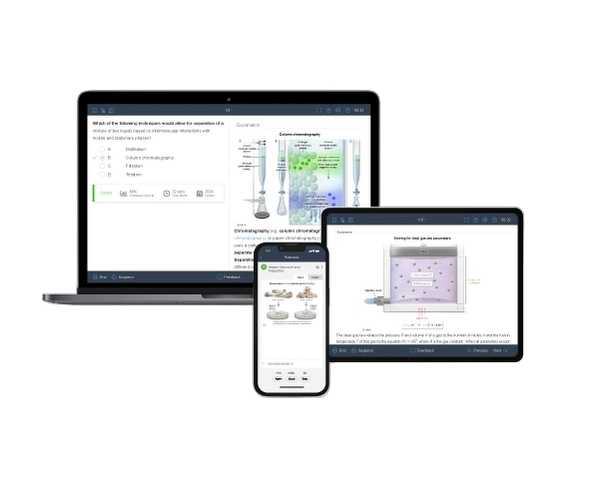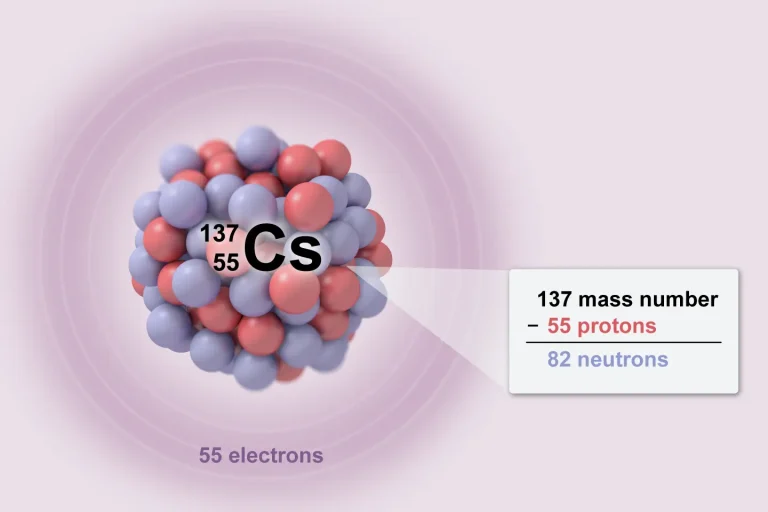AP® Chemistry is equivalent to an introductory college-level general chemistry course. This college course is the first chemistry course that undergraduate students take. You will learn the same material while taking AP Chemistry in high school.
You will develop a strong chemistry foundation through the inquiry-based approach of the AP course. Topics you will learn about include atomic structure, chemical reactions, and thermodynamics. While you may have explored some of these topics earlier, the AP Chemistry course will enable you to study them at a more advanced level.
AP Chemistry may seem harder than AP Biology or even AP Physics, but its difficulty level is subjective. While AP Chemistry involves memorization and content application, in-depth critical thinking is also important. The curriculum covers a wide range of content over 9 units, each covering several topics. AP Chemistry involves a lot of calculations. Mathematical routines are 1 of the science practices that are part of the AP Chemistry curriculum.
If you take AP Chemistry in high school and get a final exam score of 3 or above, you may be eligible to earn college credit and placement.
The prerequisites for taking AP Chemistry are:
- High school chemistry
- Algebra II
What Is on the AP Chemistry Exam?
The AP Chemistry exam tests your skills in collecting and analyzing data, creating models, and applying mathematical routines to chemistry topics. It is based on the 9 units of the course.
| Units | Unit Name | Exam Weightage |
|---|---|---|
| Unit 1 | Atomic Structure and Properties | 7-9% |
| Unit 2 | Unit 2: Compound Structure and Properties | 7-9% |
| Unit 3 | Properties of Substances and Mixtures | 18-22% |
| Unit 4 | Chemical Reactions | 7-9% |
| Unit 5 | Kinetics | 7-9% |
| Unit 6 | Thermodynamics | 7-9% |
| Unit 7 | Principles of Equilibrium | 7-9% |
| Unit 8 | Acids and Bases | 11-15% |
| Unit 9 | Thermodynamics and Electrochemistry | 7-9% |
These concepts are designed primarily to ensure that you develop 6 key science practices. All the questions on the exam will be based on these practices:
- Models and Representations
- Question and Method
- Representing Data and Phenomena
- Model Analysis
- Mathematical Routines
- Argumentation
AP Chemistry Exam Format
The AP Chemistry exam is divided into 2 sections. Section 1 includes multiple-choice questions (MCQs), while Section 2 has free-response questions (FRQs). The exam lasts for 3 hours and 15 minutes, and you will have access to a periodic table and formula sheet.
| Question Type | Score Weightage | Number of Questions | Time |
|---|---|---|---|
| Multiple-Choice Questions | 50% | 60 | 1 hour and 30 minutes |
| Free-Response Questions | 50% | 7 | 1 hour and 45 minutes |
In Section 1, you will earn 1 point for each correct answer. There are 2 types of free-response questions in Section 2: long-essay and short-answer. The 3 long essay questions are worth 10 points each, and the 4 short-answer questions are worth 4 points each.
The multiple-choice questions are computer-graded, without penalty for wrong answers. Because the answers in Section 2 are handwritten and not choice-based, the free-response questions are graded manually by AP teachers and college professors based on the quality and accuracy of your answers.
Get a little more insight into the exam format by reading our article about the AP Chemistry exam format.
Why Take AP Chemistry?
AP Chemistry course covers a vast amount of material. However, if you're excited by the subject, this might be the course for you! In 2024, 151,121 students attempted the AP Chemistry exam, and 75.6% scored 3 or above.
AP Chemistry enables you to develop a strong foundation in chemical studies. Let's examine more benefits to taking AP Chemistry.
- College Credit: Scoring between 3 and 5 on the AP Chemistry exam can earn you college credit, depending on the college to which you are applying. Most colleges take your AP Chemistry exam score into account while granting admissions. If your score meets your college's minimum requirement, you could earn credit, allowing you to skip first-year introductory chemistry courses.
- Spare Time for Other Courses: Your AP Chemistry exam score could enable you to earn college credit for introductory chemistry courses (and sometimes the corresponding labs, depending on your college or university). This will free up your time to take other courses that you might be interested in and may not have been able to take otherwise.
- Save on College Tuition: By taking AP Chemistry and earning college credit while in high school, you could reduce the number of classes you need to take and potentially save on college tuition.
- Strong Foundation for College: The concepts you will learn in AP Chem are those taught in an introductory collegiate-level general chemistry course. Taking this course will give you a deeper understanding of the subject and a strong foundation for further studies in chemistry.
- Develop Your Skill Set: Studying chemistry requires you to use several skills for theoretical concepts and applications. AP Chemistry helps you develop those skills as you progress through the course. This can set you up for success when you take higher-level courses.
- Academically Challenging: While this course is challenging, it will interest someone with a strong desire to study chemistry. Completing the AP Chemistry course and taking the exam can make your transcript stand out to college admissions panels. It will show them that you are a student who rose to the challenge of taking AP Chemistry and is used to the pace of a college-level chemistry course.
- Decide Your Career: If you have been thinking about a career in the chemistry field, taking AP Chemistry will help confirm that you really enjoy the subject matter. It will also give you an idea about the subject's difficulty and the dedication required to study chemistry.

Should You Take AP Chemistry?
Deciding whether to take AP Chemistry while in high school depends entirely on you. Every student is different and will have a different aptitude for chemistry. However, here are a few questions to ask yourself to help you decide whether AP Chemistry is the right course for you.
- Have you taken high school chemistry?
Given that it is highly recommended that you take a high school chemistry class before taking AP Chemistry, you want to make sure that you are well-versed in basic chemistry. If you have never taken chemistry before, you might find this course considerably more challenging because you will have to catch up and learn the information you are expected to know.
- Have you taken Algebra II?
Another prerequisite for taking AP Chemistry is Algebra II. AP Chemistry involves a lot of mathematical calculations. In fact, almost every unit in the course curriculum has topics that require math skills. So if you haven't studied Algebra II, you might find this course a little harder than those who have taken this math class previously.
- How interested are you in chemistry?
AP Chemistry can be a very challenging course and requires many hours of studying. You will need to cover 9 units in addition to conducting labs and preparing for the exam. This can be a lot for someone to handle if they aren't interested in chemistry.
- Has chemistry always been your strong suit?
If you have previously studied chemistry, you should have a good idea of how well you can do in chemistry. While being passionate about the subject is important, it's also equally important to be able to study and ace the exams. If one of your academic strengths has consistently been chemistry, then you will definitely enjoy taking AP Chemistry.
- Do you want to continue studying chemistry?
Most students take AP courses for the chance to earn college credits. If you intend to continue your chemistry education at the college level, then taking AP chemistry can benefit you because you can start with higher-level chemistry classes when you get to college.
Is AP Chemistry Hard?
Evaluating whether to take AP Chemistry while in high school depends entirely on your strengths and interests. Every student is different and will have a varying aptitude for chemistry. Here are a few questions to ask yourself to help you decide whether AP Chemistry is the right course for you.
- If you've done well in chemistry and mathematics in the past, then you should be able to cover the course content of AP Chemistry with relative ease.
- If you look at the score distribution from the past few years, you will find that AP Chemistry has a lower percentage of students scoring above 3 compared to other AP Science courses, such as AP Biology. It can be a challenging course, but if you have high-quality study material, you should be able to excel.
- Although you will need to memorize some information from various units within the course, such as the properties of various substances, a formula sheet is provided during the exam. But, you will need to know how to apply them. This requires critical and analytical thinking.
- Your high school schedule might be quite packed. To do well in AP Chem, you must be able to dedicate enough time to study, do homework, work on the lab component, and prepare for the exam. Consider your schedule for the year you plan to take AP Chemistry, especially around the AP exam date. Utilizing our AP Chemistry Question Bank can help you practice exam-style questions and reinforce key concepts effectively.
AP Chemistry Review Tips
AP Chemistry may be challenging, but we have a few quick exam review tips to help you ace the exam!
- Make a schedule: A well-planned schedule is the best way to keep track of the topics you've covered and those you have yet to work on.
- Get familiar with the exam format: Understanding the exam format will help you know what to expect on the exam so that you won't be caught off guard in the middle of your test-taking experience.
- Review materials: Invest in high-quality review materials such as our AP Chemistry online course and flashcards. You can also create your own formula sheet for quick review closer to the exam. Alternatively, you can use our AP Chemistry formula sheet to review more efficiently.
To get more practice and review tips for AP Chemistry, check out our guide on How to Study for AP Chemistry.

Frequently Asked Questions (FAQs)
What do I bring to the AP Chemistry exam?
For the AP Chemistry exam2, you would need to bring the following:
- A scientific or graphing calculator is recommended; a 4-function calculator is allowed but not recommended!
- No. 2 pencils to use for the multiple-choice section of the exam.
- Dark blue or black ink pens for the free response section.
- If you opted for any exam accommodations, don’t forget to bring your College Board® SSD Accommodations Letter.
Where can I find past AP Chemistry exam questions?
You can find previous AP Chemistry released exam questions on the College Board website.
When is the AP Chem 2025 Exam?
The AP Chemistry exam in 2025 will be held on May 6 at 8 a.m. local time.
What happens if you fail the AP Chemistry Exam?
While you can retake the exam as many times as needed, the College Board offers advanced placement exams once a year. For a graduating senior, it may be impractical to retake the exam.
Don’t be discouraged if you don’t achieve the score you hoped for on the AP Biology exam. Research from the College Board shows students who take AP courses but score below a 3 perform better than their non-AP peers in introductory college courses. Reflect on what study skills you may need to cultivate for future academic and career success. Use that knowledge to help you as you move forward in your studies.
When do students usually take AP Chemistry?
Students usually take the AP Chemistry exam in their junior or senior year of high school.
How much does the AP Chemistry exam cost?
The AP Chemistry exam costs $99 for students in the U.S., Canada, and U.S. territories and $129 if you are an international student. For more information, please read our article on AP Exam Eligibility, Registration & Cost.
Can I pass the AP Chemistry exam by just learning from a normal chemistry class?
Students are required to take high school chemistry before signing up for AP Chemistry.
References
1(2024). AP Chemistry. Courses & Exam Pages. AP Central Retrieved February 07, 2024 from https://apcentral.collegeboard.org/courses/ap-chemistry#:~:text=Students%20cultivate%20their%20understanding%20of,substances%3B%20transformations%3B%20and%20energy.
2(2024). What to Bring on AP Exam Day. AP Central Retrieved February 07, 2024 from https://apstudents.collegeboard.org/exam-policies-guidelines/what-to-bring-on-exam-day
Read More About the AP Chemistry Exam
Looking for a break-down of the AP Chemistry exam format? Check out this article that explains the AP Chem exam format, sections, types of questions, and more!
AP Chemistry Course and Exam DescriptionIt is hard to review all the pages of the official CED pdf. Check out this easy-to-read AP Chemistry Course and Exam Description for in-depth info on the exam, units, and topics!
AP Chemistry Scoring GuideWant to know everything about AP Chemistry Scoring? Here's our easy-to-follow article on scoring and score distribution—including the list of top colleges and their minimum AP Chem score requirements.
How to Self-Study for AP ChemistrySelf-studying for AP Chemistry? Discover tips on mastering concepts, tackling practice problems, and staying organized to excel on the AP Chemistry exam!
Best AP Chemistry Study Guide ComparisonStruggling to choose the best study guide? Compare Kaplan, Barron's, Princeton Review, and UWorld to find the perfect AP Chemistry study guide for your exam success!
Best AP Chemistry Prep Course ComparisonDiscover the best AP Chemistry prep courses! This in-depth review helps you compare options and pick the course that meets your needs.




